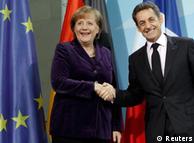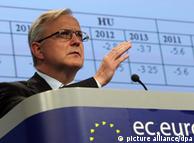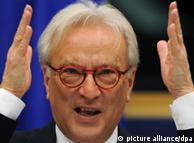EUROPEAN UNION | 29.01.2012
EU budget pact - a major breakthrough?
The last details of the EU budget pact are being negotiated, but the German government is optimistic that it will all work out in the end. And no wonder, as the idea for stricter budget discipline comes from Chancellor Angela Merkel.
At the last EU summit in December, Merkel joyfully declared that the agreement by all member states, with the exception of Britain, was the breakthrough needed for a long-term resolution to the bloc's debt crisis.
In less than two months, a treaty text has been worked out in what has to be a record time.
The fiscal pact, however, does not have quite the bite originally intended by Merkel and French President Nicolas Sarkozy, the political minds behind the proposal.
German Central Bank President Jens Weidmann is now calling the treaty an important "contribution" to solving the crisis.
Sanctions for debtors
 France and Germany launched the fiscal pact proposalElmar Brok, a European parliamentarian from Merkel's Christian Democratic Party who took part in the negotiations, views the pact as an important "component" but not enough to solve the crisis on its own. Brok told Deutsche Welle that there were a few things that could have been improved.
France and Germany launched the fiscal pact proposalElmar Brok, a European parliamentarian from Merkel's Christian Democratic Party who took part in the negotiations, views the pact as an important "component" but not enough to solve the crisis on its own. Brok told Deutsche Welle that there were a few things that could have been improved.
"But I think now it's possible to impose sanctions and launch legal proceedings against debtors automatically," he said.
Although the treaty was agreed on outside the framework of the European Union, because Britain vetoed the process, it is supposed to later become part of EU law. Brok considers that aspect especially important.
"The community methodology was upheld so that no division of Europe could develop," said Brok.
British Prime Minister David Cameron vetoed the deal because he said he was concerned about forfeiting national budget sovereignty.
And in fact, the accord does call for automatic penalties in the case of excessive budget deficits, but what that ceiling will be is still under negotiation. In addition, a debt limit mechanism has been introduced which is supposed to lead to balanced budgets in the long term.
This point was a key issue for Chancellor Merkel, because Germany already has a debt limit written into its constitution. Berlin was unable, however, to push through a proposal to enshrine debt limits in the constitutions of all member states. What's more, under certain extraordinary circumstances, such as steep recessions, there can be exceptions.
Merkel has rejected complaints that she was trying to force her will on others just because she represented the largest eurozone country.
"We are prepared to learn from one another," the chancellor said this week in Berlin during a visit with Belgian Prime Minister Elio Di Rupo. "It has nothing to do with dominance. It's not our fault that we're this big."
 Nothing really new, except the debt limit, said RehnNothing really new
Nothing really new, except the debt limit, said RehnNothing really new
Except for the debt limit - that is, to reduce deficits and not accrue new debt - there is nothing entirely new in the budget pact rules. Olli Rehn, the EU's monetary affairs commissioner, told a meeting of EU finance ministers in Brussels that 99 percent of the regulations in the new pact were already part of existing EU law. He said the whole idea was to underscore that point.
"The fiscal pact is a fundamental obligation to budget discipline by the national parliaments of EU members," Rehn said. "That is the actual purpose. It will be achieved mainly by implementing existing rules and regulations."
Only those countries which join the budget pact can expect to receive aid from the 17-nation eurozone rescue fund. Within the next year, the treaty is expected to come into effect following ratification by the national parliaments. That, too, would be a record-breaking time frame for the EU.
Experts agree the treaty is not a big help in the current crisis but that it will bear fruit in the future. Jean Pisani-Ferry, from the Brussels-based think tank Bruegel, points out that a real fiscal union with common budget and debt policies is still a long way off.
"Actually, we need more political integration, but we are seeing the exact opposite. There is no political will to abandon one's own sovereignty, especially not in France," he notes.
A political sideshow
The president of the EU Commission, Jose Manuel Barroso, has warned that the fiscal pact, which Britain has not agreed to, must not and cannot be used to create new institutions that would compete with existing common structures. He said anything else would generate confusion.
 Just a political sideshow, says Swoboda"The treaty must, in the end, lead to more Europe, not less," Barroso stressed.
Just a political sideshow, says Swoboda"The treaty must, in the end, lead to more Europe, not less," Barroso stressed.
The leader of the Socialist group in the European Parliament, Hannes Swoboda of Austria, has criticized Merkel and Sarkozy, both conservatives. He told DW that focusing on the fiscal pact alone was wrong.
Labeling the budget treaty "a sideshow," Swoboda said it was much more important to discuss the role of the European Central Bank in issuing eurobonds and providing other economic stimulus measures.
"There are sufficient political structures in Europe, but so far the heads of state and government, especially Chancellor Merkel, have refused to work within these structures," Swoboda said. There is no political will for a joint solution, he added.
Polish Prime Minister Donald Tusk has expressed his reservations about the fiscal union, calling for more input from those countries that do not yet have the euro. Furthermore, no one in Brussels quite knows how Hungarian Prime Minister Viktor Orban will vote when the negotiations are completed. Orban, who recently was massively criticized for possible treaty violations on another set of issues, could reject the pact.
To prevent any delays, the majority of EU leaders want to enact the new treaty, even if it's not ratified by all the participating countries. Just how high this threshold will be - 10, 12 or 17 members - is still undecided.
Author: Bernd Riegert / gb
Editor: Joanna Impey
Editor: Joanna Impey

Comments